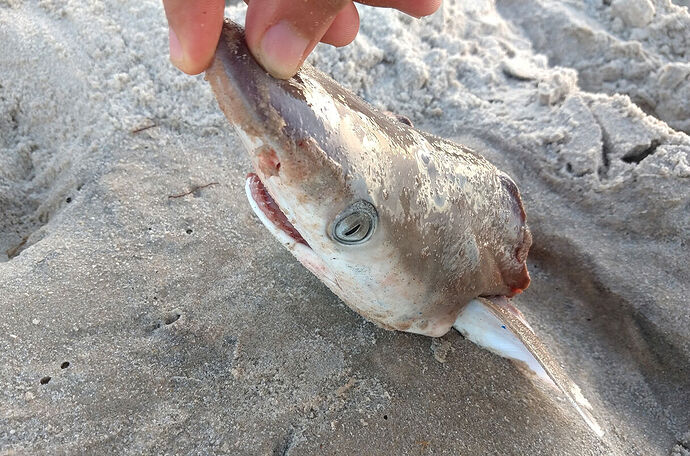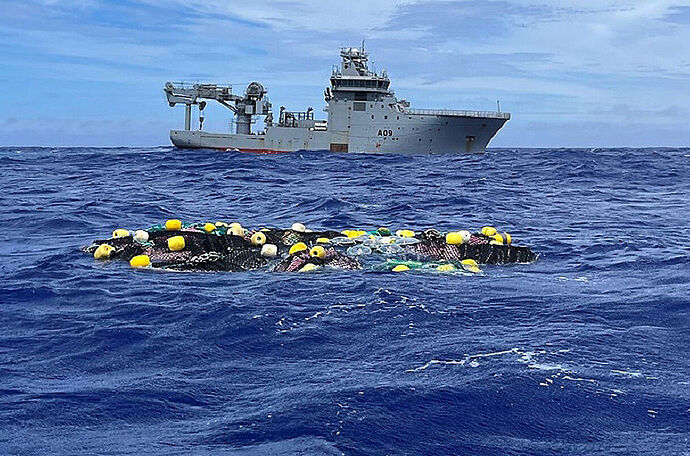‘Cocaine sharks’ found in waters off Brazil
Sharpnose sharks may or may not eat drifting bales of coke, but a positive drug test highlights risk of pollution
2023 was a big year for sharks on coke. First came Cocaine Shark, a B movie about mutant, murderous sharks (which, apparently, never did the drug). A few months later, documentary filmmakers released the more sober Cocaine Sharks, which tried to find out whether sharks in the Gulf of Mexico devour the many packages of coke lost or dumped by drug smugglers.
“It’s a catchy headline to shed light on a real problem,” Tracy Fanara, a science communicator with the National Oceanic and Atmospheric Administration (NOAA), told The Guardian last year. Fanara participated in the doc and highlighted the issue of wildlife being exposed to drugs and other pollution. In the end, however, the evidence for coke-addled sharks was inconclusive.
Now, scientists in Brazil report the first proof that the animals are indeed exposed to cocaine. Thirteen sharpnose sharks taken from coastal waters near Rio de Janeiro had traces of the drug in their muscles and livers, researchers report this week in Science of the Total Environment.
The findings are “very important and potentially worrying,” says Sara Novais, a marine ecotoxicologist at the Marine and Environmental Sciences Centre of the Polytechnic University of Leiria. Novais, who was not involved in the study, cautions that more research is needed to determine whether the sharks—or the humans who eat them—are harmed by the exposure.
Cocaine has been detected in sewage and rivers in many countries, including Brazil. Around Rio de Janeiro, the drug probably enters the sea directly in drainage from illegal labs where cocaine is refined. It also comes from drug users via untreated sewage. Cocaine packs lost or dumped by traffickers could also be a source.
Enrico Mendes Saggioro, an ecotoxicologist with the Oswaldo Cruz Institute, and his colleagues were curious whether sharks might be exposed to cocaine. Brazilian sharpnose sharks (Rhizoprionodon lalandii) spend their entire lives in coastal waters. So Saggioro figured they would be among the species most likely to take up the drug, either directly from seawater or from the fish they eat—or possibly from drifting packages. Unlike the celebrity predators in Cocaine Sharks—great hammerheads, tiger sharks, and other hefty species—the Brazilian sharks were juvenile and small adults, averaging 52 centimeters long and weighing less than a quart of milk.
The team bought 13 sharks from small fishing vessels that target the species and others. After dissecting the sharks in the lab, the team tested muscle and liver tissue using a standard technique called liquid chromatography with tandem mass spectrometry. All samples came back positive, and the concentrations were as much as 100 times higher than previously reported for other aquatic creatures.
Floating packages of cocaine could be a source of drug contamination of sharks, but polluted water may be a more likely source.New Zealand Defense/ZUMA via Alamy
“This is evidence of the increasing danger of cocaine pollution,” says Anna Capaldo, an endocrinologist and expert in environmental pollution at the University of Naples Federico II who did not participate in the research.
One concern is that toxicants in the sharks’ livers can hinder production of vitellogenin, which becomes the yolk needed for egg cells. All females in the study were pregnant, although the consequences of cocaine exposure for the fetuses are unknown. Also still unclear is whether the drug affects shark behavior.
Cocaine can be toxic to mollusks, crustaceans, and bony fish. Previous laboratory studies have shown environmentally realistic concentrations can cause various signs of damage—DNA fragmentation and cell death, for example—in zebrafish embryos. Tests of eels revealed disruption of important hormones. Only a handful of other studies have tested wild fish for illegal narcotics.
Saggioro and his co-authors call for more testing for cocaine in coastal waters to figure out exactly where it’s coming from. As apex predators that eat fish across a wide area, sharks could serve as sentinels for hot spots of illegal drug pollution. The team also notes that sharks are a common source of food in Brazil. If highly contaminated with cocaine, they might be a health risk.
https://www.science.org/content/article/cocaine-sharks-found-waters-brazil

